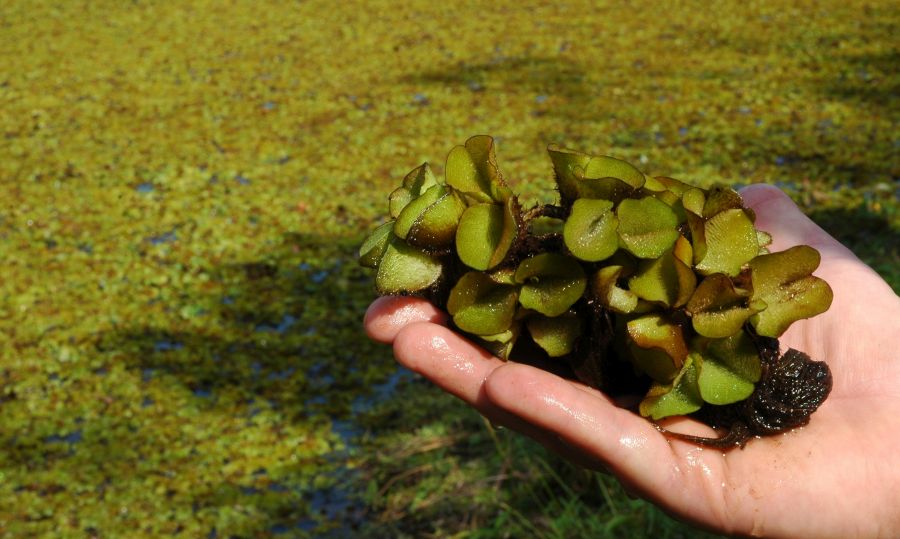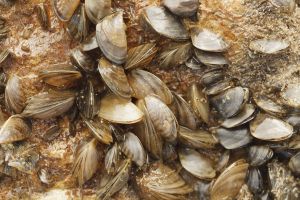
Source: AgriLife Today | Oct. 29, 2020
With waterfowl season opening day around the corner, the Texas Parks and Wildlife Department (TPWD) is reminding waterfowl hunters to clean, drain and dry boats and equipment before traveling from lake to lake to help avoid spreading invasive species like giant salvinia and zebra mussels.
Aquatic invasive plants can easily become entangled or trapped on boats and boat trailers and moved to other lakes. Giant salvinia, one of the most problematic aquatic invasive plants in Texas, can double in size and acreage in less than a week, quickly becoming a problem. Just a small fragment can cause an infestation in a new lake, making it even more important for boaters to clean, drain, and dry their gear.
“Giant salvinia is often thought of as a plant that blocks recreational access for anglers and boaters, but it can cause serious problems for waterfowl hunters too,” said John Findeisen, TPWD Aquatic Habitat Enhancement Team Lead. “Not only does it form thick mats that block access for hunters to prime waterfowl hunting areas, it can also outgrow and replace the native plants that waterfowl rely on for food and habitat.”
Another major invasive species threat in Texas is zebra mussels. Currently, zebra mussels are found in 30 Texas reservoirs across five river basins as well as in river reaches downstream of infested lakes. These invaders can litter shorelines with sharp shells, impact recreation, harm aquatic life, damage boats and clog water intakes.
“Waterfowl Hunters can help keep zebra mussels and other invasive species from being moved and harming more lakes by taking a few minutes to remove plants and debris from boats, along with draining water before leaving the lake and allowing everything to dry completely afterward,” said Monica McGarrity, TPWD Senior Scientist for Aquatic Invasive Species Management. “Taking just a few minutes for these simple steps can help prevent impacts on ecosystems, infrastructure, and recreation and make a huge difference in our efforts to protect and preserve Texas lakes for future generations.”
In addition to cleaning their boats and trailers, hunters should also make sure they aren’t inadvertently carrying the invasive species on other equipment like waders, decoys, decoy bags, and marsh sleds. A video to help hunters properly clean, drain and dry can be found on the TPWD YouTube Channel or see below.
On top of the harm these organisms can cause to aquatic ecosystems and the recreational experience at lakes, the transport of aquatic invasive species can result in legal trouble for hunters. Transporting prohibited invasive species in Texas is illegal and punishable with a fine of up to $500 per violation. Boaters are also required to drain all water from their boat and onboard receptacles, including bait buckets, before leaving or approaching a public body of fresh water.
The special youth-only duck season begins in the High Plains Mallard Management Unit on Oct. 24, followed by youth-only duck season in the South Zone on Oct. 31 and the North Zone on Nov. 7. Regular duck season in the High Plains Mallard Management Unit opens Oct. 31, in the South Zone on Nov. 7 and the North Zone on Nov. 14. Other season dates by waterfowl species can be found in the Outdoor Annual.
TPWD and partners monitor for invasive species in Texas lakes, but anyone who finds them in lakes where they haven’t been found before or who spots them on boats, trailers or equipment that is being moved should help identify and prevent new introductions by reporting the sighting to TPWD at (512) 389-4848 or by emailing photos and location information to [email protected].
To learn more about giant salvinia, zebra mussels and other invasive species in Texas, visit tpwd.texas.gov/StopInvasives.

